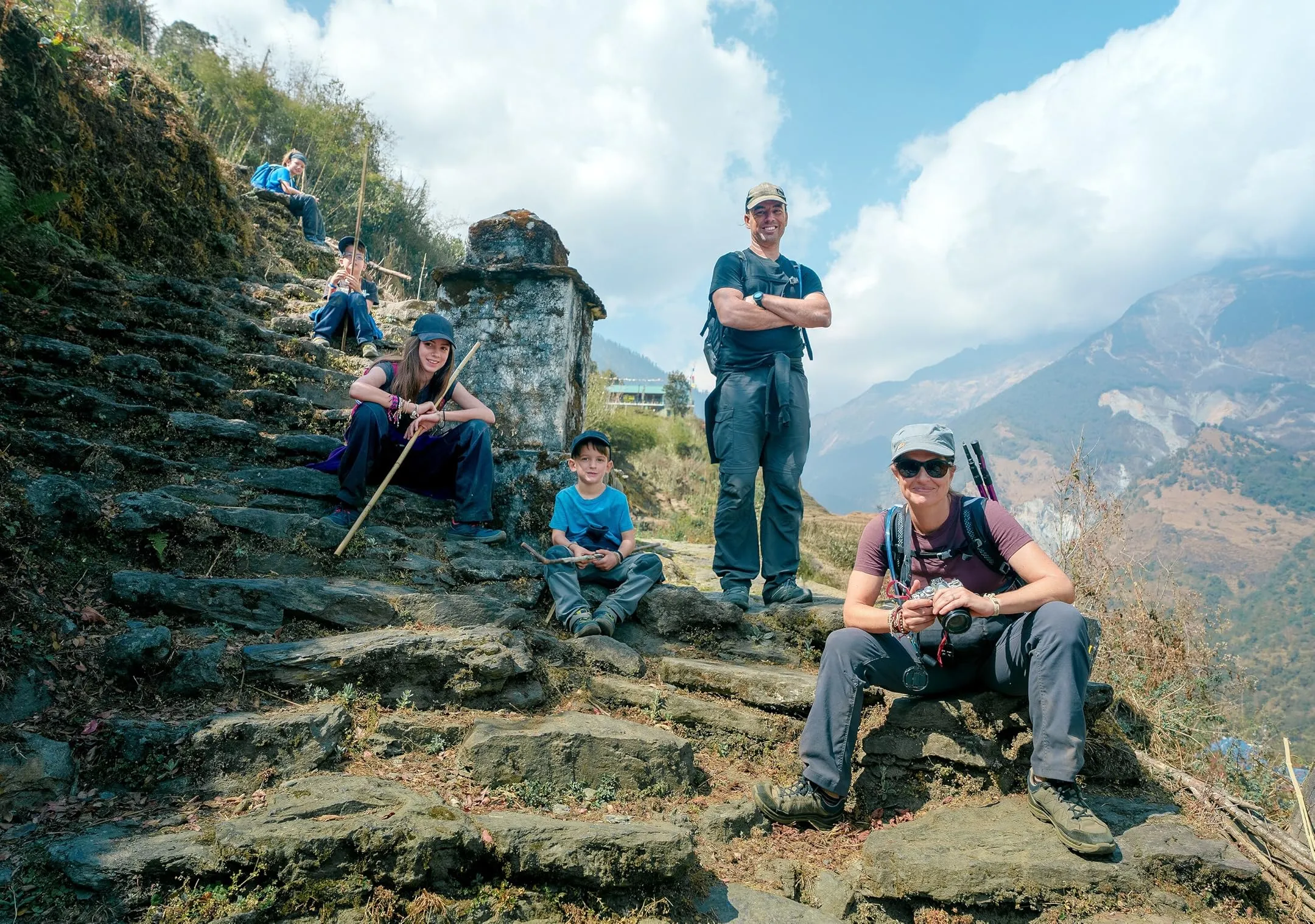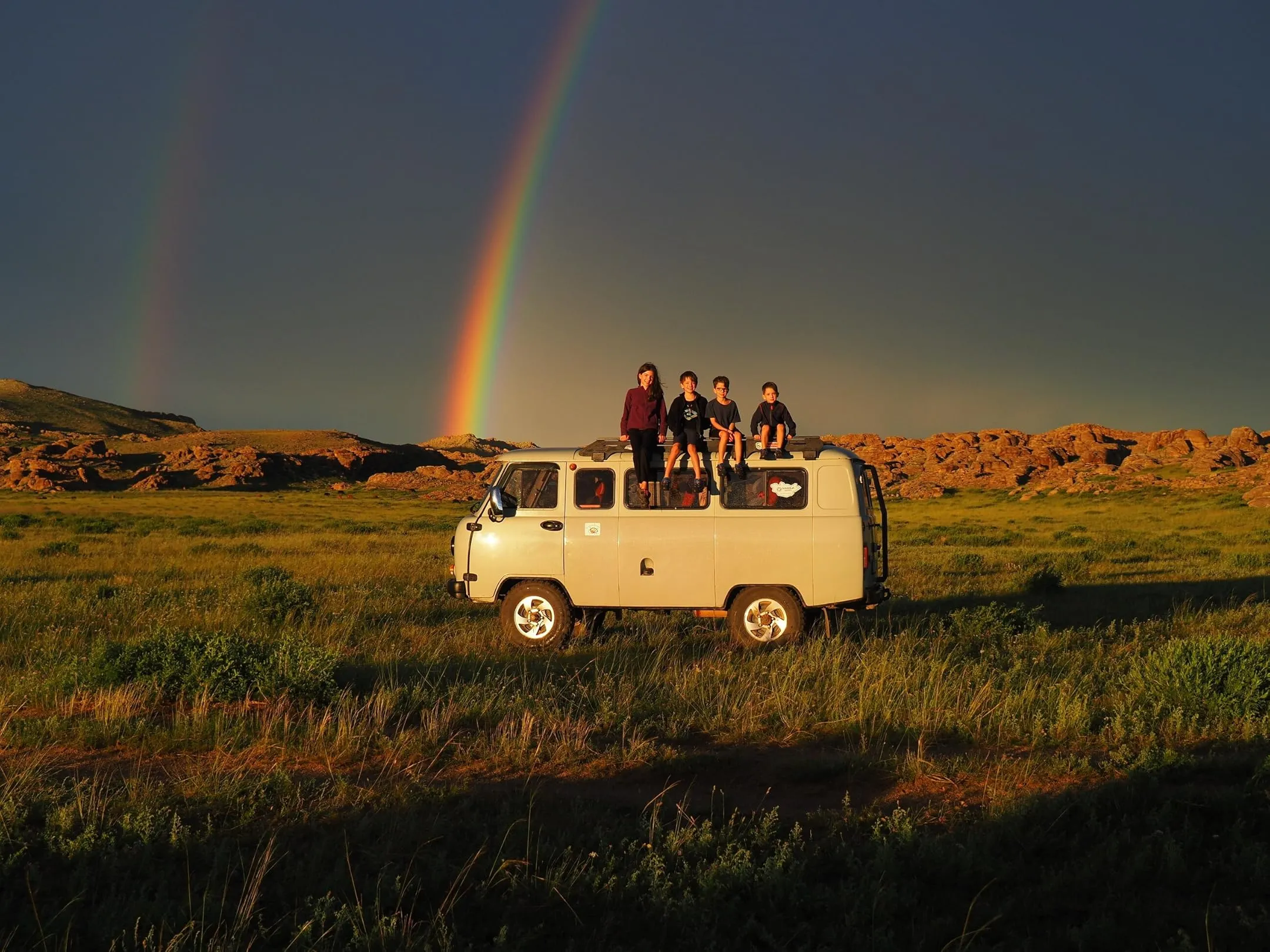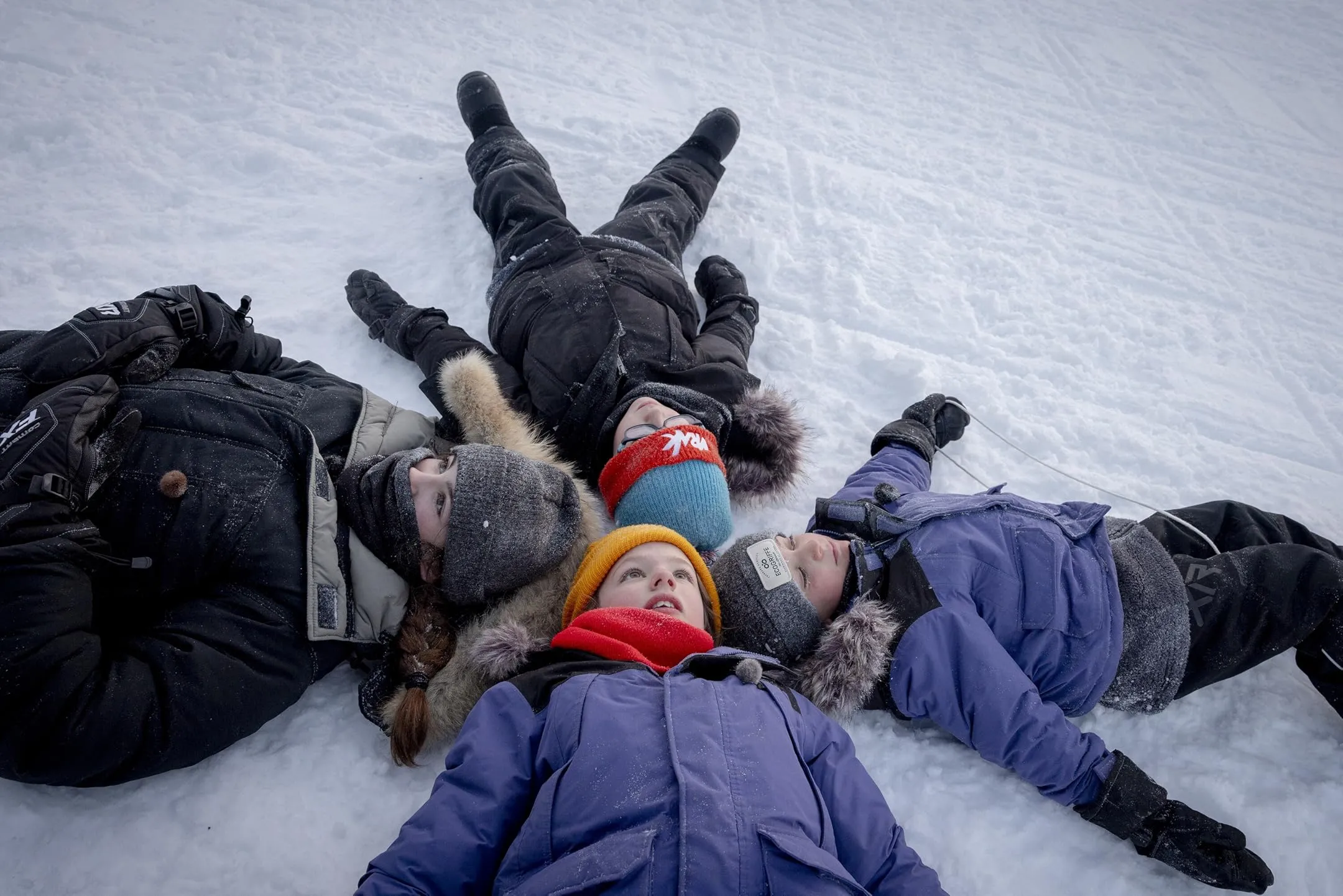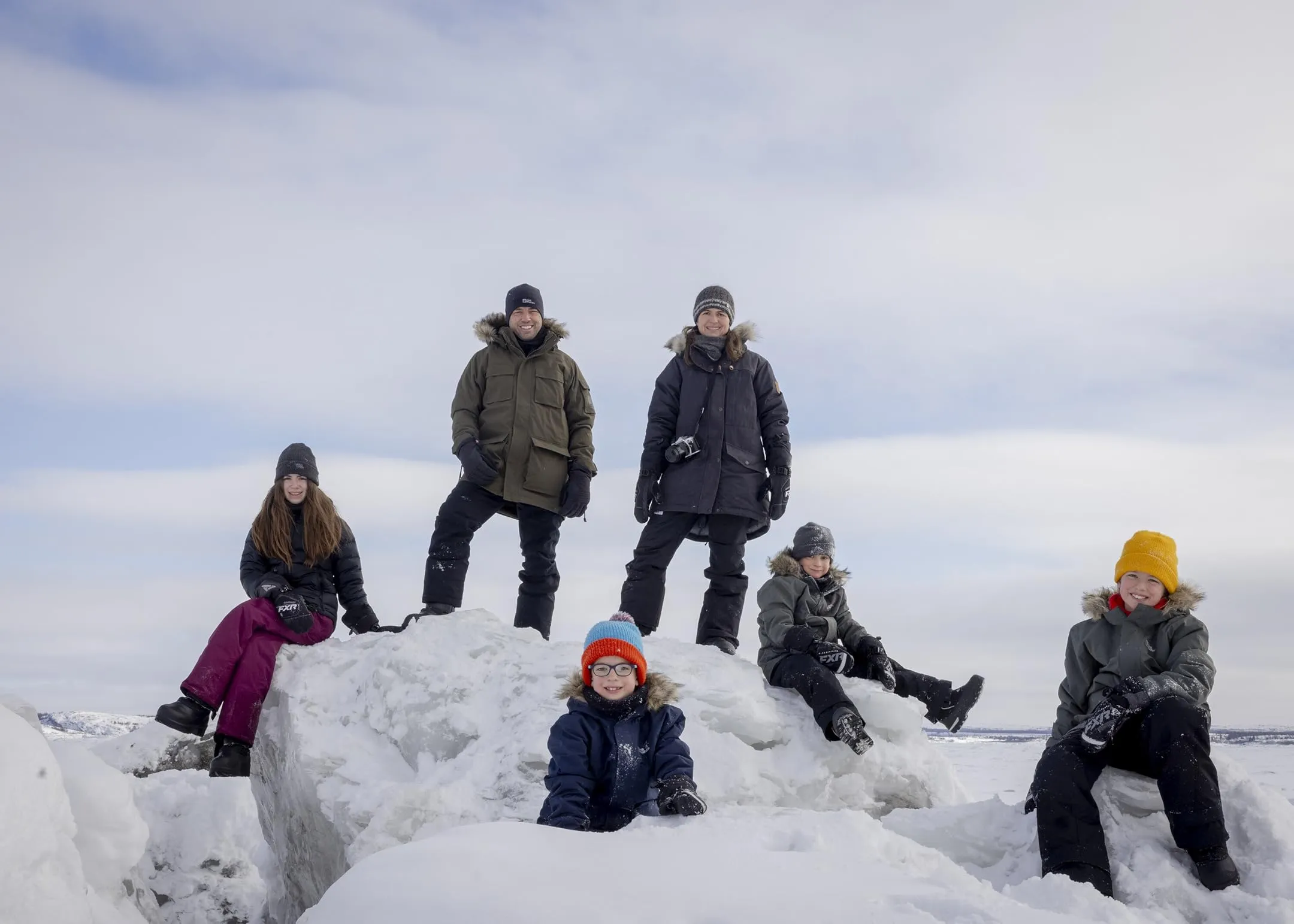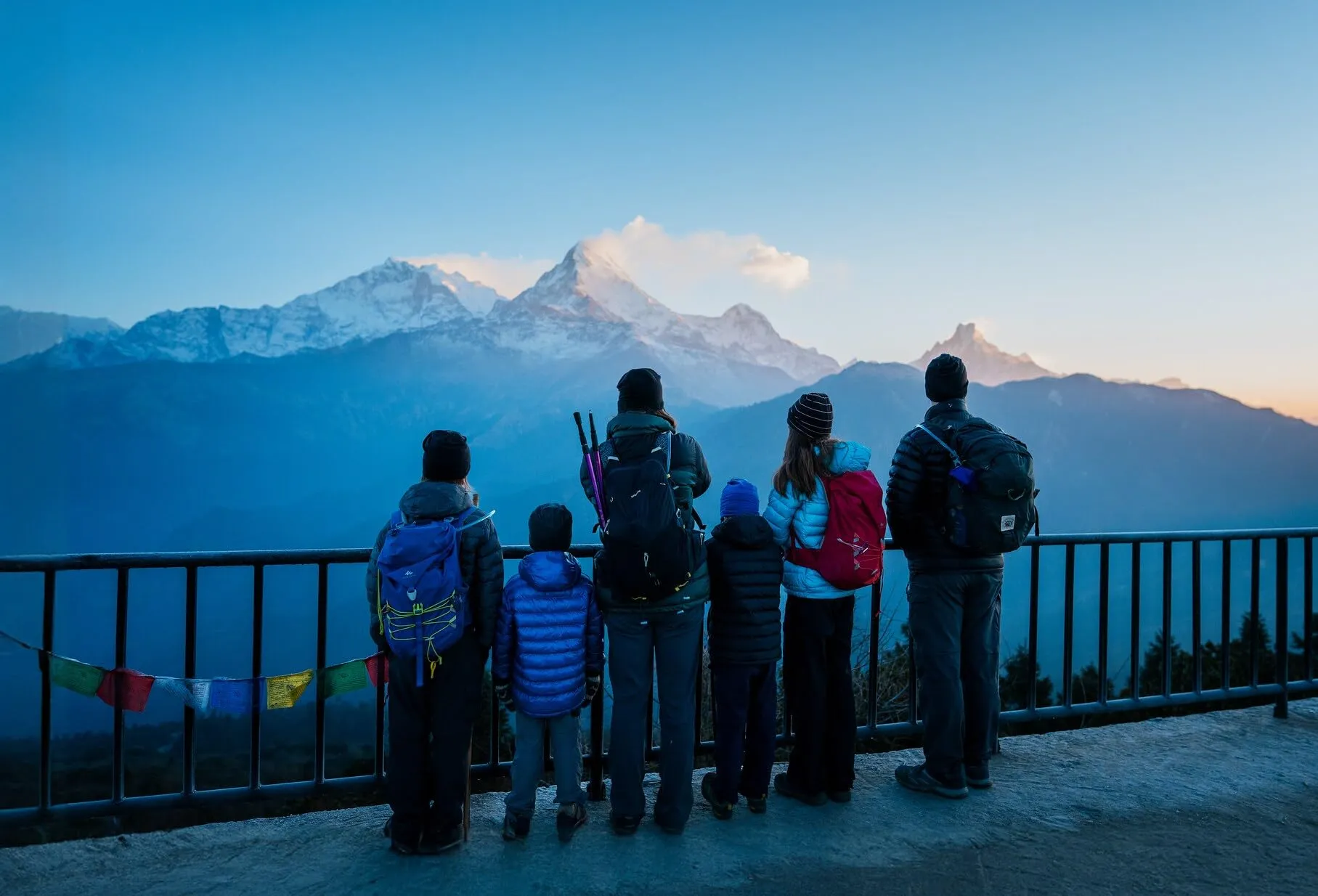The documentary “Blink” tells an astonishing story of resilience, love, and the great human spirit through the prism of the Pelletier family’s global journey. Daniel Roher and Edmund Stenson, known for their Oscar-winning documentary “Navalny,” direct the film, which follows a Montreal-based family facing a heartbreaking challenge: three of their four children—Mia, Colin, and Laurent—have been diagnosed with retinitis pigmentosa, a rare genetic condition that will inevitably result in total blindness.
Rather than succumbing to despair, parents Édith Lemay and Sébastien Pelletier turn their potential tragedy into a transforming journey. They devise a daring, life-affirming strategy: a year-long globe voyage to fill their children’s minds with vivid visual experiences before darkness falls. With a $200 daily budget and an adventurous spirit, they travel across continents, passing through Malaysia, Nepal, Egypt, Ecuador, and the Amazon basin, creating an unforgettable, once-in-a-lifetime adventure.
Their adventure isn’t simply about breathtaking scenery or fascinating destinations. It’s a profound meditation on perception, resilience, and the human spirit’s incredible ability to discover joy and meaning amid insurmountable obstacles. The Pelletiers are not just preserving memories on their trips but also altering how their children will experience and comprehend the world in the future.
Mapping Memories: A Family’s Courageous Cartography
The Pelletier family’s journey begins with a devastating diagnosis that would break most families: three of their four children, Mia, Colin, and Laurent, would gradually lose their vision due to retinitis pigmentosa. But where others see only darkness, Édith and Sébastien see a chance for bold change.
Their plan is bold yet immensely loving: a year-long global adventure to fill their children’s minds with vivid, lasting memories. The family creates a bucket list that sounds like a child’s wildest dreams: riding hot air balloons, exploring jungles, trekking mountain paths, and learning new languages. They are not simply traveling but purposefully taking visual snapshots that will become valuable mental photographs.
Their journey becomes an incredible zigzag across continents. In Malaysia, they become immersed in the local culture. The Himalayas become their outdoor classroom, with multiplication tables recited against breathtaking mountain scenery. Egypt’s White Desert transforms into a canvas of sunset memories. At the same time, the Amazon basin provides raw, unadulterated encounters of natural splendor.
The journey is hardly a glossy postcard adventure. It is punctuated by real-life experiences, such as family squabbles, unexpected hurdles, and profound emotional breakthroughs. During Léo’s birthday, young Laurent confronts the reality of his future blindness, promising to build a gadget that will restore vision—a moment that is both tragic and surprisingly optimistic.
Throughout it all, Édith and Sébastien manage intricate logistics with superhuman patience. Laundry gets done. Bills are paid. But, more crucially, they are teaching their children that life is defined by the bravery to embrace experiences rather than constraints completely.
Navigating Uncertainty: Portraits of Resilience
At the core of “Blink” are parents Édith Lemay and Sébastien Pelletier, a couple who redefine parental greatness. Their approach to an untenable situation is neither spectacular nor defeated but remarkably pragmatic and kind. When you get to four kids, you accept chaos,” Édith openly admits, exhibiting a spirit of perseverance that serves as the documentary’s beating heart.
Throughout this incredible voyage, each Pelletier child develops his or her individuality. Mia, the oldest at 11, has a scholarly focus and occasional impromptu dances. Léo stands out as the most courageous, unaffected by the impending diagnoses. Colin, the middle kid, exudes a gentle reserve typical of his family. Laurent, the youngest, is a bundle of emotional complexity—smart enough to recognize something significant is happening but still processing the implications of his future.
The family’s interactions reflect an incredible dynamic. They bicker like siblings, gripe about travel discomforts, and work through difficult situations together. During a nine-hour gondola ride in Ecuador, their combined uneasiness grows. Colin’s heartbreaking departure to Bella, a puppy in Nepal, demonstrates the depth of emotional connection these children can form.
Perhaps most striking is how the children respond to difficulties. Whether trekking through Amazonian mud or hiking Himalayan mountains, they consistently show extraordinary adaptability. The parents do not hide children from adversity but encourage them to fully deal with the world’s complexities.
Their path becomes less about avoiding darkness and more about accepting tangible and symbolic light. Each meeting, each shared experience, transforms a potential tragedy into a story of deep human connection.
Beyond Sight: Mapping the Landscape of Human Resilience
“Blink” is more than just a trip documentary; it delves into the depths of human experience. At its heart, the film is a masterclass in resilience, changing what could have been a story of tragedy into a celebration of unlimited human potential.
The Pelletier family’s journey becomes an effective metaphor for dealing with life’s most difficult diagnoses. Their method does not reject the truth of oncoming blindness but rather fills their children’s inner worlds with rich, bright experiences. Each destination is more than just a geographical location; it is an intentional act of memory-making, a rebellious gesture against the darkness threatening their children’s vision.
Love emerges here in modest, transformational moments, not in great declarations. Laurent’s commitment to constructing a gadget to restore vision on his brother’s birthday demonstrates genuine hope. The parents’ love is as profound, demonstrated via rigorous planning, everyday practicalities, and an unshakable dedication to extracting joy from uncertainty.
The documentary challenges conventional myths about disability, highlighting adaptation as a source of strength. These aren’t victims looking for sympathy; they’re explorers actively shaping their narrative. Their trip implies that experiences are more important than perfect sensory perception—that the richness of life is characterized by how profoundly we engage with the world, not what we perceive.
Philosophical implications emerge subtly: acceptance is not defeat but a brave reinvention of possibilities. The Pelletiers show that constraints may serve as launching pads for remarkable adventures. That vulnerability can coexist with incredible power.
Framing Humanity: Visual Poetry in Motion
“Blink” is a cinematic masterpiece that elevates visual narrative to an intimate emotional experience. Directors Daniel Roher and Edmund Stenson create a visual narrative that is both vast and intimately personal, with global landscapes serving as more than just backdrops—they become characters themselves.
The film’s most profound visual breakthrough is its portrayal of perception. In one particularly memorable scene, the screen goes entirely black, allowing the family’s voices to create an intense sensory experience. This deliberate strategy encourages viewers to consider vision beyond physical sight, implying that perceiving the world extends beyond visual input.
Cinematographer Jean-Sébastien Francoeur catches the Pelletiers with extraordinary familiarity. His perspective shifts between spectacular panoramic shots—sun-drenched Himalayan peaks and austere Egyptian deserts—and intimate, emotionally charged close-ups that show microscopic family interactions. Each frame feels precisely planned but wonderfully spontaneous.
The visual analogies that describe the children’s increasing vision loss are intriguing. The family’s internal journey is discreetly communicated through soft focus edges, occasional blurring, and altering lighting quality. The camera analyzes emotional landscapes with amazing sensitivity rather than simply documenting them.
Global locations become more than just geographic markers. Visual storytelling transforms these locations into emotive territories in Malaysia, Nepal, Egypt, and Ecuador. Each destination is more than just a location; it is a memory that has been purposefully etched into the children’s consciousness.
The cinematography accomplishes a remarkable feat: it brings the invisible—emotional resilience, familial love, human adaptation—to light.
Storytelling Unfiltered: Crafting Truth Through Lens
Daniel Roher and Edmund Stenson approach “Blink” with the most valuable tools of a documentary filmmaker: radical empathy and little intervention. Their directing attitude converts potentially melodramatic material into a subtle, very human story that is alive with realism.
The production’s most ingenious decision stems from its financial limits. The filmmakers push the Pelletier family to engage in honest, unscripted conversations for only $200 daily. Hostels and tourist enclaves by home stays are replacing luxury hotehomestaysconomic strategy becomes a storytelling technique, removing staged travel experiences and showing real, unadulterated human connections.
Roher and Stenson’s lens does not strive to romanticize the family’s difficulties or create fabricated drama. Instead, it makes room for complex emotions—Laurent’s devastating realization of his impending blindness, the parents’ quiet moments of vulnerability, and the children’s unvarnished joy throughout foreign adventures.
Their approach is surgical in terms of emotional precision. Challenging issues, such as genetic diagnosis and potential loss, are handled with surprising restraint. There are no deceptive music swells or overblown narration—just raw, unvarnished human experience.
The directors recognize that true storytelling is about creating a window into human resiliency rather than building a perfect storyline. They don’t just document a voyage; they capture a family’s delicate dance, changing a potentially tragic situation into an unforgettable adventure.
Navigating Worlds: Beyond Borders and Boundaries
The Pelletier family’s journey becomes a masterclass in global citizenship. Their journeys are not tourist photos but rather deep cultural immersions. Whether hiking Himalayan mountains, negotiating Egyptian deserts, or exploring Amazonian ecosystems, they interact with local communities as curious, polite learners.
Their experience is almost unbelievable in terms of logistics. Managing laundry, school, finances, and child care while ping-ponging around continents necessitates near-human organization. Édith and Sébastien embody adaptation as they change hostel rooms into classrooms, navigate intricate transportation systems, and maintain family peace in perpetual unpredictability.
Each cultural interaction presents a learning opportunity. Multiplication tables are recited along mountain routes. Language barriers become bridges. The children discover that the world is huge and closely connected—an important lesson transcending their next visual hurdles.
Their voyage demonstrates that great travel is not about meticulous planning but about welcoming unforeseen situations with grace, curiosity, and open hearts.
The Review
Blink
"Blink" is more than just a documentary; it's a profound meditation on human resilience, love, and the astonishing ability to turn tragedy into an epic celebration of life. The Pelletier family does more than just deal with their difficult diagnosis; they also debunk traditional disability narratives, demonstrating that vision extends far beyond physical sight. They create a stunning monument to the human spirit's incredible adaptability by purposefully gathering visual memories from worldwide. Directors Daniel Roher and Edmund Stenson have created a documentary that defies genre, teaching audiences about optimism, family relationships, and the transformational power of intentional living. This isn't a loss story but about abundance—about filling life with rich and colorful experiences that become an internal light that can withstand any exterior darkness. A truly emotional, precisely made documentary that will drastically change viewers' perspectives on survival, family, and the meaning of perception.
PROS
- Extraordinary emotional depth and authenticity
- Stunning global cinematography
- Powerful narrative of human resilience
- Nuanced portrayal of family dynamics
- Innovative approach to documenting disability
- Remarkable directorial sensitivity
- Inspiring message of hope and adaptation
CONS
- Potentially emotionally challenging for sensitive viewers
- Limited exploration of medical aspects of retinitis pigmentosa
- Might feel overwhelming in its emotional intensity









































